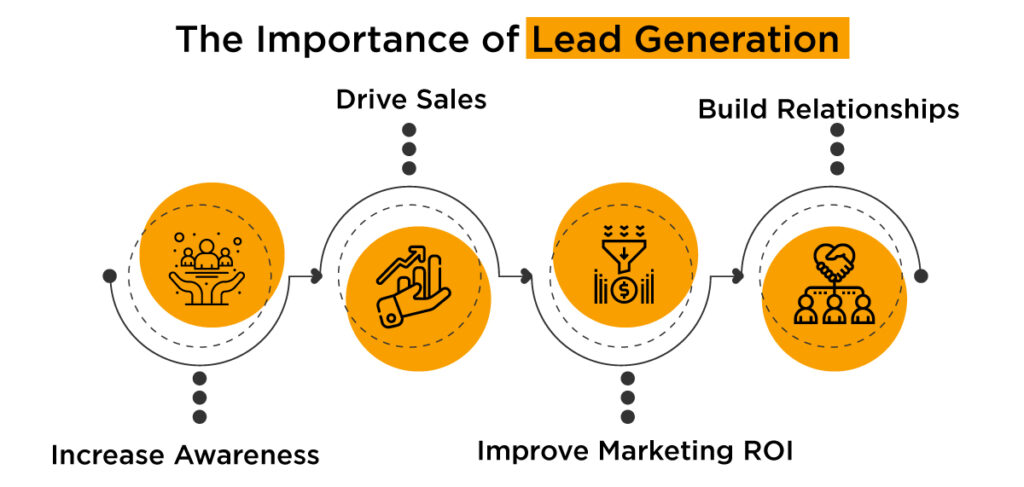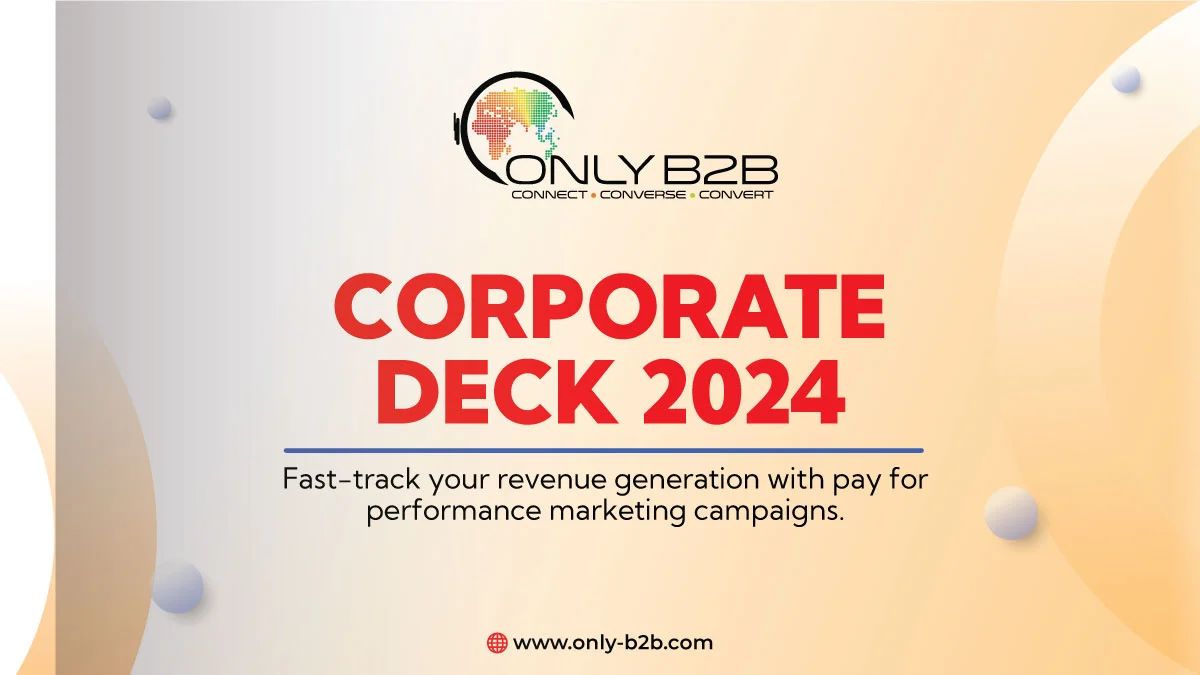
Generating leads is a crucial part of any business-to-business (B2B) sales and marketing strategy. As a B2B company, your success depends on your ability to generate B2B leads and convert them into paying customers.
Lead generation is the process of attracting and nurturing potential customers with the goal of turning them into long-term, profitable relationships.
In this blog, we’ll explore the key strategies and tactics you can use to generate high-quality leads for your B2B business. Here is a beginner’s guide to help you get started:
What is a B2B Lead
Table of Contents
- 1 What is a B2B Lead
- 2 What is lead generation?
- 3 Account-Based Marketing (ABM):
- 3.1 Factors you need to consider while generating B2B Leads
- 3.1.1 Know Your Target Audience:
- 3.1.2 Offer Valuable Content:
- 3.1.3 Utilize Social Media:
- 3.1.4 Attend Industry Events:
- 3.1.5 Optimize Your Website:
- 3.1.6 Use Email Marketing:
- 3.1.7 Implement Lead Scoring:
- 3.1.8 B2B Lead Generation Trends & Benchmarks
- 3.1.8.1 Increased Focus on Personalization:
- 3.1.8.2 Increased Use of Artificial Intelligence (AI):
- 3.1.8.3 Increased Investment in Content Marketing:
- 3.1.8.4 Increased Use of Referral Marketing:
- 3.1.8.5 Increased Use of Account-Based Marketing (ABM):
- 3.1.8.6 Benchmarks:
- 3.1.8.7 Measurement:
- 3.1.8.8 Conclusion:
- 3.2 Share this:
- 3.1 Factors you need to consider while generating B2B Leads
A B2B lead is a potential customer who has shown interest in a business-to-business (B2B) company’s products or services. In B2B marketing, leads are individuals or organizations that are considered to have the potential to become paying customers.
They are typically identified through various lead generation strategies, such as attending industry events, creating valuable content, and utilizing social media. The goal of B2B lead generation is to attract, nurture, and convert these leads into long-term, profitable relationships. B2B leads are often different from B2C leads in that they involve more complex sales cycles, higher ticket prices, and longer decision-making processes.
What is lead generation?
Lead generation is the process of attracting and nurturing potential customers for a business with the goal of turning them into long-term, profitable relationships. The objective of lead generation is to identify individuals or organizations that have the potential to become paying customers and to provide them with information and resources that can help them make informed purchasing decisions.
Lead generation can involve a variety of tactics and strategies, including creating valuable content, attending industry events, utilizing social media, optimizing website and landing pages, and using email marketing.
The leads generated through these efforts are typically tracked and scored based on their engagement and potential to become a customer, so that the business can prioritize their lead nurturing and conversion efforts.
Must Read: 6 Reasons You Are Failing To Generate Quality B2B Leads
The Importance of Lead Generation:
Lead generation is important for businesses because it helps to identify and nurture potential customers who have the potential to become long-term, profitable relationships. By generating leads, businesses can:

Increase Awareness:
Lead generation helps to increase awareness about a business’s products or services and can reach new audiences. This can help to expand the business’s customer base and attract new customers.
Drive Sales:
By nurturing leads and providing them with valuable information and resources, businesses can increase the likelihood of converting leads into paying customers. This, in turn, drives sales and revenue for the business.
Improve Marketing ROI:
Lead generation allows businesses to focus their marketing efforts on individuals and organizations that have a high potential to become customers. This helps to improve the return on investment (ROI) of marketing efforts and ensure that resources are being used effectively.
Build Relationships:
Lead generation helps businesses to build relationships with potential customers by providing valuable information and resources, and engaging with them through various marketing channels. This can help to establish trust and credibility, and increase the likelihood of converting leads into customers.
In short, lead generation is critical for the success of any business. It helps to identify and nurture potential customers, drive sales, improve marketing ROI, and build relationships. By implementing effective lead generation strategies, businesses can grow their customer base and achieve long-term success.
Must Read: High-Performance Inbound Marketing Techniques for Successful Lead Generation Campaigns
Types of Leads generation
There are several types of lead generation that businesses can use to attract and nurture potential customers:
Inbound Lead Generation:
This type of lead generation involves attracting potential customers to a business through valuable content, such as blog posts, e-books, webinars, and infographics. Inbound lead generation is focused on providing valuable information to potential customers and building relationships over time.
Outbound Lead Generation:
This type of lead generation involves actively reaching out to potential customers through tactics such as cold calling, direct mail, email campaigns, and paid advertising. Outbound lead generation is often more direct and focused on generating leads quickly.
Event Lead Generation:
This type of lead generation involves attending and participating in events, such as trade shows, conferences, and webinars, to meet potential customers and generate leads. Event lead generation allows businesses to connect with potential customers in person and provide them with information and resources.
Referral Lead Generation:
This type of lead generation involves leveraging personal and professional networks to generate leads and referrals. Referral lead generation can be an effective way to reach new potential customers and generate leads quickly.
Social Media Lead Generation:
This type of lead generation involves utilizing social media platforms, such as LinkedIn, Twitter, and Facebook, to connect with potential customers and generate leads. Social media lead generation can be an effective way to reach new audiences and engage with potential customers on a more personal level.
Each type of lead generation has its own strengths and weaknesses, and the best approach will depend on the business’s goals, target audience, and resources. Effective lead generation often involves a combination of different tactics and strategies, and businesses should regularly assess and adjust their lead generation efforts to ensure they are generating the highest-quality leads possible.
How to Qualify a B2B Lead
Qualifying a B2B lead (Sales qualified or Marketing qualified) is the process of evaluating a potential customer’s interest and ability to purchase a business’s products or services. The goal of lead qualification is to identify high-quality leads and prioritize them for follow-up and conversion. Here are some steps to qualify a B2B lead:
Define your Ideal Customer Profile (ICP):
Your ICP should describe the characteristics of your ideal customer, including industry, company size, and decision-maker’s role. This will help you to determine if a lead is a good fit for your business.
Gather Information:
Collect information about the lead, such as their company, job title, and contact information. This will help you to understand their role and potential needs.
Determine Budget and Authority:
Ask questions to determine if the lead has the budget and authority to make a purchasing decision. This will help you to assess if they have the resources and decision-making power to become a customer.
Evaluate Pain Points:
Ask questions to understand the lead’s challenges and pain points. This will help you to determine if your products or services can solve their problems and meet their needs.
Assess their Buying Stage:
Determine where the lead is in the buying process, such as awareness, consideration, or decision. This will help you to understand how far along they are in their buying journey and how best to engage with them.
By following these steps, businesses can effectively qualify B2B leads and prioritize their lead nurturing and conversion efforts. However, it’s important to note that lead qualification is an ongoing process and that businesses should regularly re-evaluate leads as they move through the sales funnel.
Must Read: Quality Vs Quantity Lead Generation: Who Wins The Race?
B2B Lead Generation Strategies
There are many different strategies that businesses can use to generate B2B leads, and the best approach will depend on the business’s goals, target audience, and resources. Here are some effective B2B lead generation strategies:
Content Marketing:
Create and share valuable content, such as blog posts, e-books, webinars, and infographics, to attract potential customers and educate them about your products or services. Content marketing can help to establish your business as an authority in your industry and build trust with potential customers.
Search Engine Optimization (SEO):
Optimize your website and content for search engines to increase visibility and attract potential customers through organic search. This can help to drive traffic to your site and increase the likelihood of generating leads.
Paid Advertising:
Utilize paid advertising, such as Google AdWords or LinkedIn Ads, to reach potential customers and drive traffic to your site. Paid advertising can be an effective way to quickly reach new audiences and generate leads.
Email Marketing:
Use email marketing to engage with potential customers and provide them with valuable information and resources. Email marketing can help to build relationships and increase the likelihood of converting leads into customers.
Networking:
Attend events and participate in online communities to connect with potential customers and generate leads. Networking can help you to build relationships with potential customers and provide valuable information and resources.
Referral Marketing:
Encourage customers and partners to refer others to your business. Referral marketing can be an effective way to generate leads quickly and build relationships with potential customers.
Account-Based Marketing (ABM):
Target specific companies and decision-makers with personalized marketing campaigns to generate leads and close deals. ABM can be an effective strategy for businesses that sell to large, complex organizations.
By using a combination of these strategies, businesses can generate high-quality B2B leads and achieve long-term success. It’s important to regularly evaluate and adjust lead generation strategies to ensure that they are generating the highest-quality leads possible.
Must Read: Best Account Based Marketing Tactics: Dominate B2B Marketing in 2023
Factors you need to consider while generating B2B Leads
Know Your Target Audience:
To generate leads effectively, it’s important to understand your target audience. This includes identifying the types of companies and decision-makers that are likely to need your products or services. Conduct market research to gather information on your target audience and their pain points, so you can tailor your lead generation efforts to their specific needs.
Offer Valuable Content:
Content is a powerful tool for attracting and nurturing leads. Offer educational resources, such as e-books, webinars, and blog posts, that provide value to your target audience and position you as an expert in your field. Make sure the content is easily accessible and shareable, so it can reach a wider audience.
Utilize Social Media:
Social media platforms, such as LinkedIn and Twitter, can be powerful tools for generating B2B leads. Engage with your target audience by sharing relevant content, participating in online discussions, and promoting your products and services. Use social media to build relationships and establish your brand as a thought leader in your industry.
Attend Industry Events:
Attending trade shows, conferences, and other industry events is a great way to network with potential leads and build relationships. Participate in panel discussions, host a booth, and engage with attendees to promote your products and services.
Optimize Your Website:
Your website is often the first point of contact between your business and potential leads. Make sure it’s optimized for lead generation by including clear calls-to-action and forms for visitors to fill out to receive more information or request a demo. Ensure the website is user-friendly and easy to navigate, so visitors can quickly find what they’re looking for.
Use Email Marketing:
Email marketing is a cost-effective way to nurture leads and keep them engaged with your business. Create email campaigns that provide valuable information and promote your products and services. Segment your email list based on the interests and behaviors of your leads to ensure your messages are relevant and targeted.
Implement Lead Scoring:
Lead scoring is the process of assigning a numerical value to each lead based on their engagement with your company and their likelihood to become a customer. This allows you to prioritize your lead generation efforts and focus on the most promising leads.
Basically, lead generation is a crucial part of any successful B2B marketing strategy. By understanding your target audience, offering valuable content, utilizing social media, attending industry events, optimizing your website, using email marketing, and implementing lead scoring, you can generate high-quality leads and grow your business.
Must Read: Preparing Your Business for 2023 With B2B Lead Generation Strategies
B2B Lead Generation Trends & Benchmarks
B2B lead generation is constantly evolving as technology and buyer behavior change. Here are some of the current trends and benchmarks for B2B lead generation:
Increased Focus on Personalization:
Personalized marketing campaigns are becoming increasingly popular as businesses seek to build relationships with potential customers and increase conversions.
Increased Use of Artificial Intelligence (AI):
AI is being used more frequently to automate lead generation processes, such as lead scoring, lead nurturing, and lead prioritization.
Increased Investment in Content Marketing:
Businesses are investing more in content marketing, such as blog posts, webinars, and e-books, to attract potential customers and educate them about their products or services.
Increased Use of Referral Marketing:
Referral marketing is becoming more popular as businesses seek to generate leads and build relationships with potential customers.
Increased Use of Account-Based Marketing (ABM):
ABM is becoming increasingly popular as businesses seek to target specific companies and decision-makers with personalized marketing campaigns.
Benchmarks:
According to the State of B2B Lead Generation report, the average cost per lead for B2B businesses is $33, and the average conversion rate for B2B leads is 7%. However, these benchmarks can vary significantly based on industry and company size.
Measurement:
Businesses are increasingly using marketing automation and analytics to measure the effectiveness of their lead generation efforts and optimize their strategies.
These trends and benchmarks highlight the importance of personalization, technology, and measurement in B2B lead generation. Businesses that stay up-to-date with these trends and benchmarks are more likely to generate high-quality leads and achieve long-term success.
Conclusion:
In conclusion, B2B lead generation is a critical component of any successful business. By attracting potential customers and educating them about your products or services, you can increase the likelihood of generating leads and closing deals.
There are many different strategies that businesses can use to generate B2B leads, including content marketing, search engine optimization (SEO), paid advertising, email marketing, networking, referral marketing, and account-based marketing (ABM).
B2B lead generation is constantly evolving as technology and buyer behavior change. Some of the current trends in B2B lead generation include increased focus on personalization, increased use of artificial intelligence (AI), increased investment in content marketing, increased use of referral marketing, increased use of account-based marketing (ABM), and increased use of measurement.
By staying up-to-date with these trends and benchmarks, businesses can generate high-quality leads and achieve long-term success. With the right strategies in place, B2B lead generation can help you to grow your business, build relationships with potential customers, and achieve your long-term goals.

Vikas Bhatt is the Co-Founder of ONLY B2B, a premium B2B lead generation company that specializes in helping businesses achieve their growth objectives through targeted marketing & sales campaigns. With 10+ years of experience in the industry, Vikas has a deep understanding of the challenges faced by businesses today and has developed a unique approach to lead generation that has helped clients across a range of industries around the globe. As a thought leader in the B2B marketing community, ONLY B2B specializes in demand generation, content syndication, database services and more.


